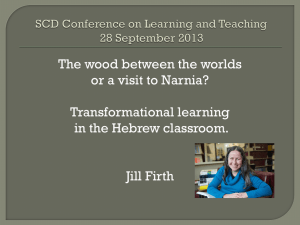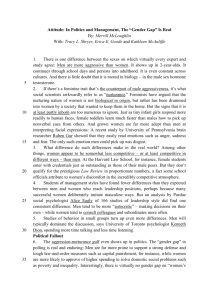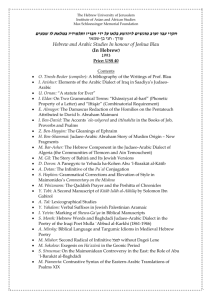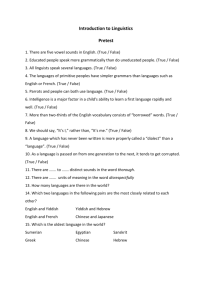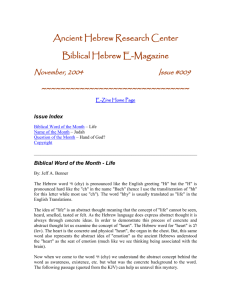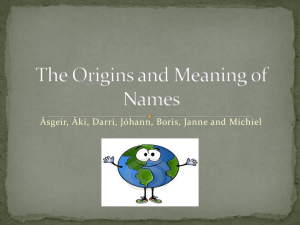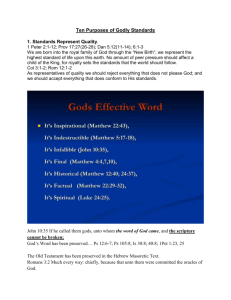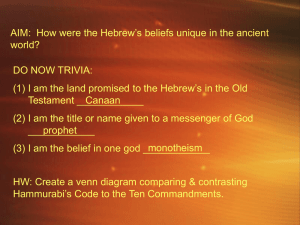Biblical Hebrew E-Magazine - Ancient Hebrew Research Center
advertisement
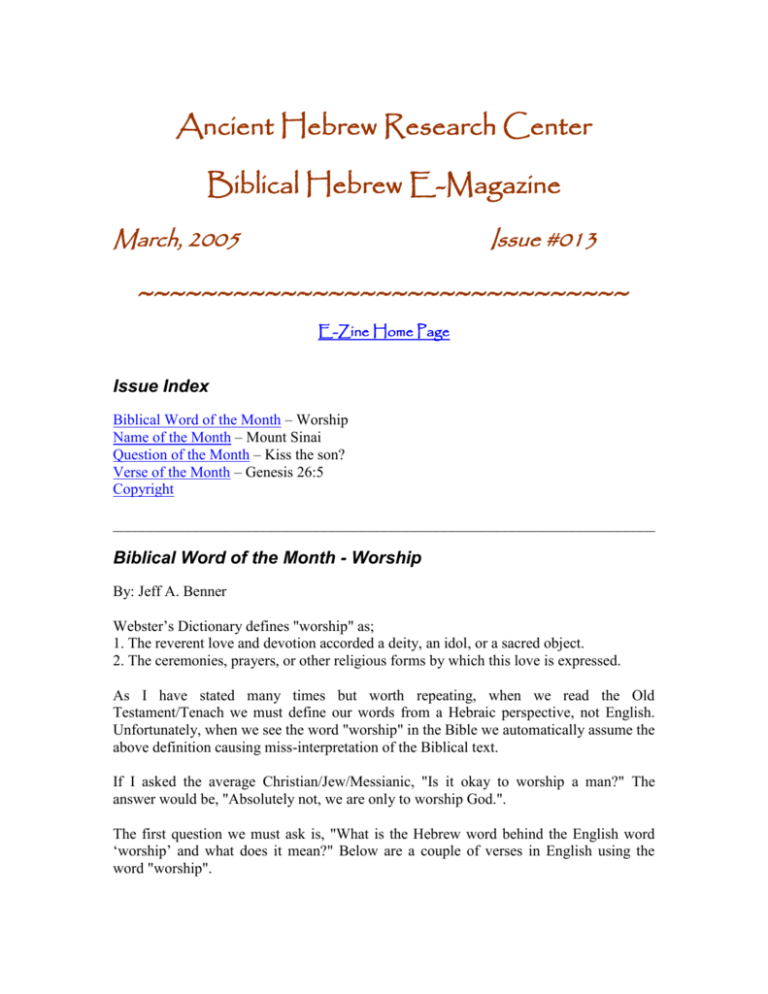
Ancient Hebrew Research Center Biblical Hebrew E-Magazine March, 2005 Issue #013 ~~~~~~~~~~~~~~~~~~~~~~~~~~~~~~~ E-Zine Home Page Issue Index Biblical Word of the Month – Worship Name of the Month – Mount Sinai Question of the Month – Kiss the son? Verse of the Month – Genesis 26:5 Copyright ________________________________________________________________________ Biblical Word of the Month - Worship By: Jeff A. Benner Webster’s Dictionary defines "worship" as; 1. The reverent love and devotion accorded a deity, an idol, or a sacred object. 2. The ceremonies, prayers, or other religious forms by which this love is expressed. As I have stated many times but worth repeating, when we read the Old Testament/Tenach we must define our words from a Hebraic perspective, not English. Unfortunately, when we see the word "worship" in the Bible we automatically assume the above definition causing miss-interpretation of the Biblical text. If I asked the average Christian/Jew/Messianic, "Is it okay to worship a man?" The answer would be, "Absolutely not, we are only to worship God.". The first question we must ask is, "What is the Hebrew word behind the English word ‘worship’ and what does it mean?" Below are a couple of verses in English using the word "worship". Biblical Hebrew E-Magazine Genesis 24:26 And the man bowed down his head, and worshipped the LORD. 1 Samuel 15:31 So Samuel turned again after Saul; and Saul worshipped the LORD. Psalm 29:2 Give unto the LORD the glory due unto his name; worship the LORD in the beauty of holiness. In each of these verses the Hebrew word behind the English word "worship" is "shahhah" (the hh is pronounced hard like the ch in the name Bach). This Hebrew word appears 172 times in the Biblical text but is only translated as "worship" 99 times in the KJV. Below are some other translations of this same word. Gen 27:29 Let people serve thee, and nations bow down to thee In this passage other nations will bow down/worship the descendents of Jacob. Exo 18:7 And Moses went out to meet his father in law, and did obeisance, and kissed him; and they asked each other of [their] welfare; and they came into the tent. In this passage Moses bowed down/worshiped his father-in-law. 1 Kings 1:53 So king Solomon sent, and they brought him [Adonijah] down from the altar. And he came and bowed himself to king Solomon: and Solomon said unto him, Go to thine house. In this passage Adonijah was found righteous when he bowed down/worshiped Solomon. Whenever the Hebrew word "shahhah" is used as an action toward God, the translators translate this word as "worship". But, whenever this same Hebrew word is used as an action toward another man, the translators translate this word as "obeisance", "to bow" or "bow down". As you can see, the translators are preventing the reader from viewing the text in its proper Hebraic context. The literal meaning of the Hebrew word "shahhah" can be seen in Numbers 22:31 - "and he bowed down his head, and fell flat on his face". "shahhah" means to bow down with the face to the ground. The concept of "worship" as defined by Webster’s dictionary is not Hebraic in any way and is not found in the Bible. We would be better off to remove the idea of "worship" from our Biblical vocabulary and replace it with "bow down". The only true way to bow down/worship God or a man from a true Hebraic perspective is to bow down with the face to the ground. Of course, this concept of bowing is an eastern custom that is not practiced in our western culture. 2 Biblical Hebrew E-Magazine ________________________________________________________________________ Name of the Month – Mount Sinai By: Jeff A. Benner Mount Sinai (sinai - see Exodus 19:20) is the mountain that Israel met with God upon leaving Egypt. The Hebrew word Sinai (Strong's #5514) means "thorn". This word comes from the parent root SN (sin-nun), also meaning thorn. Another word derived from this parent root is seneh (#5572) meaning "thorn bush". The bush that Moses saw burning in Exodus 3:2 is a seneh. It was not just a burning bush, but a burning thorn bush. Mount Sinai is also called Mount Horeb (hhorev - see Exodus 3:1). The Hebrew word hhorev (#2722) comes from the root hharav (#2717) meaning "to lay waste", "be dried up" as well as "to fight". By definition the words sinai and hhorev are synonymous as a dry wasteland is often filled with thorn bushes. But there is also an interesting connection between the Garden of Eden and Mount Sinai. When Adam and Eve were expelled from the Garden, God placed a "flaming sword" at its entrance. The Hebrew word for "sword" is hherev (#2719). Hherev (sword/sharp) comes from the same root, hharav (fight/make waste), as the word hhorev (wasteland) which is also called Sinai (thorn/sharp). The burning thorn bush of Exodus is a picture of the flaming sword of Genesis. Is it possible that the burning bush and the flaming sword are one and the same thing? Was Mount Sinai the entrance into the Garden of Eden? _______________________________________________________________________ Question of the Month – Kiss the Son? By: Jeff A. Benner Q: Should the beginning phrase of Psalm 2:12 be translated as "embrace purity" as in the Jewish translations or "Kiss the son" as in Christian translations? A: The phrase in Hebrew is "nashku var". (The word var is actually the word "bar" but because it is preceded by a vowel it takes the spirant sound "v" instead). The word nashku is from the root N-SH-K (Strong's # 5401) which means "kiss". The "u" at the end of the word is the masculine plural imperative. When the author uses the word nashku he is telling a group of people to "Kiss ...” 3 Biblical Hebrew E-Magazine The second word is "bar" (Strong's # 1249, 1250, 1252, 1253) this word can have several meanings in Hebrew including "grain", "clean" or "pure". Combined these mean "kiss grain" or "kiss purity" with the second possibility being more in context with the verse. But there is always a but :-). There is the Aramaic word "bar" (Strong's number 1247, 1248, 1251) which can mean "son" or "field". We now have the possible translation "Kiss the son", or do we? The question is, "Is the word "bar" in Psalm 2:12 a Hebrew or Aramaic word? All of the Psalms are written in Hebrew though there are a few Aramaic words scattered through them. The Hebrew word for "son" is "ben" (Strong's # 1121) and this word is even used in this Psalm (verse 7). We see the author of Psalms 2 using the Hebrew word ben for son and it would not make sense that he would change to Aramaic later in the psalm. Therefore it makes sense that he was using the Hebrew word "bar" meaning purity, not the Aramaic word meaning "son". There is another aspect of the Aramaic word "bar" that is often overlooked. Technically the Aramaic word for son is "ben" (the same as Hebrew, Strong's # 1123). The word "bar" does not mean "son" but is the construct form of the word "ben". In Hebrew and Aramaic you would write "Kiss the son" as "nashqu ben" not "nashqu bar". When translating the Aramaic word "bar" the English word "of" must follow it as it is a construct word. For example one would say "ben avraham" (son OF Abraham) in Hebrew, but say "bar avraham" (son OF Abraham) in Aramaic. The common phrase "bar mitzvah" is actually Aramaic, not Hebrew, meaning "son OF commandments". This Aramaic word "bar" is used in Proverbs 31:2 - "What, my son? and what, O son of my womb? And what, O son of my vows?" But again, in each case the word "bar" is used in the construct state - son OF. (The translation “my son” at the beginning of the verse is a little misleading as the literal translation would be "son OF me"). In conclusion, it is my opinion that the phrase nashqu bar" should be translated as "kiss purity" rather than "kiss the son" for the following reasons. 1. The grammatical use of the word "bar" requires it to be used in the construct state "son of..." and not as a standalone word for "son". 2. The Aramaic word for "son" when not in the construct state is the word "ben" and would have been used here if that was the author's intended meaning. 3. The Hebrew word for "son", "ben", is used in this same Psalm indicating that the author would have used the word "ben" instead of "bar" if he had meant "son". 4 Biblical Hebrew E-Magazine ________________________________________________________________________ Verse of the Month – Genesis 26:5 By: Jeff A. Benner In our previous verse we saw that God made Abraham's path straight because he supported God. In this verse we are going to see how Abraham supported God. ֹותי ַ ְק ִלי ַוי ְִשמֹר ִמ ְשמַ ְר ִתי ִמצ ֹ ְר־שמַ ע ַאבְ ָׁר ָׁהם ב ָׁ ֶעֵ ֶקב אֲ ש ֹּקֹותי וְ תֹור ָֹׁתי׃ ַ ֻח Because that Abraham obeyed my voice, and kept my charge, my commandments, my statutes, and my laws (ASV) The first word is the word עקבmeaning "because". The original meaning of this word is the "heel" and is the same word in the name ( יעקבya'acov - Jacob). It literally means "to be on the heel of something". The next word is ( אשרasher) meaning which, who or that. Its original meaning is a rope and is used in the Biblical Hebrew language as a rope that attaches to thoughts together. Combining this with the previous word we have the idea of "on the heel of that", or "because". The "that" is in reference to the previous verses where God promises Abraham many descendents and this verse tells us why he is going to receive many descendents. The verb ( שמעshama) literally means "to hear". While this is understood as "to be obedient" it literally means "to hear and act upon what is heard". This can mean to be obedient but when God "heard" the cries of the Israelites in Egypt, he did not obey them; rather he acted upon that hearing by rescuing them. The next word is the name ( אברהםAbraham). The word ( בקליbeqoliy) is a combination of the prefix ( בb) meaning "in" or "with", the root word ( קלqol) meaning "voice" and the suffix ( יy) meaning "of me" or "my". While most translations read "Abraham heard my voice", the Hebrew reads "Abraham heard in/with my voice". To me this means that Abraham not only heard God but God's voice is inside of Abraham and is a part of him. This would be the end of their first thought in this verse. The next word is ( וישמרvayish'mor). The root of the word is ( שמרshamar). The word shamar literally means to guard or protect. This word is often translated as "obey" but this is not the case, though obedience can be a part of guarding and protecting something. The ( וv) means "and" which is often used to divide sentences into different thoughts. The י (y) is added to the verb root to identify the subject of the verb, masculine singular or "he", and the tense, perfect tense or completed action. 5 Biblical Hebrew E-Magazine The next four words are what Abraham heard and protected. The first is the word משמרתי (mish'mar'tiy). The suffix ( יy) again means "of me" or "my". The word מדמרת (mish'meret) is the feminine form of the word ( משמרmish'mar) which comes from the root ( שמרshamar), the same root found in the word ( טישמרvayish'mor) above meaning to guard and protect. The word ( משמרmish'meret) literally means "a guarding" and is usually used in the Torah in reference to the priestly duties of the tabernacle. In Numbers 3:25 we read; "At the Tent of Meeting the Gershonites were responsible for the care of the tabernacle and tent, its coverings, the curtain at the entrance to the Tent of Meeting". The phrase "responsible for the care of" is this word. The priests' responsibility was to "guard" the tabernacle. The second word in this list is the word ( מצותיmitsvotiy). You should be able to recognize the suffix again meaning "to me" or "my". The word ( מצותmitzvot) is the plural form of the word ( מצוהmitsvah) meaning "command". This word is often used for commands that deal with the do's and don'ts. The third word is ( חקותיhhuqotiy). The word ( חקותhhuqot) is the plural form of the word ( חקהhhuqah). Every time this word is used in the Bible it is usually used in reference to re-occurring festivals as seen in Leviticus 23:41; "Celebrate [the Feast of Tabernacles] as a festival to the LORD for seven days each year. This is to be a lasting ordinance (huqah) for the generations to come.". The word "lasting" is this same word. The final word ( ותורתיv'torotiy) contains the prefix ( וv) meaning "and", the suffix ( יy) meaning "my" and the word ( תורהtorot). The word torot is the plural form of the word ( תורהtorah). The word תורהcomes from the root ירהmeaning "to point". The father points the way for the child by teaching him the correct path he is to take in life. The literal meaning of תורהis the pointings or teachings of a father. While this word is almost always translated as "law" in the Bible, it is not a good translation. The torah of God are his teachings to his children, in the same way as the father teaches his children. The following is a literal rendering of this verse from its Hebraic meaning. Because Abraham listened/followed with my voice, and he guarded/protected my requirements for guarding my sacred places, my commands of do's and don'ts, my lasting festivals and my teachings for my children. ________________________________________________________________________ Copyright © 2005 Jeff A. Benner Ancient Hebrew Research Center Please feel free to use, copy or distribute any material within the "Biblical Hebrew E-Magazine" for nonprofit educational purposes only. ________________________________________________________________________ 6


